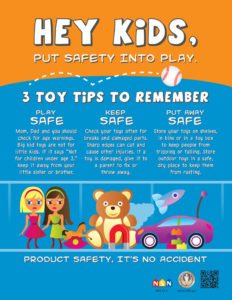 December is Safe Toys and Gifts Month, a time for Great Care families to focus on celebrating the holidays while keeping children, grandchildren, and young loved ones safe.
December is Safe Toys and Gifts Month, a time for Great Care families to focus on celebrating the holidays while keeping children, grandchildren, and young loved ones safe.
The Health Alliance Plan in Michigan, along with the National Safe Kids Campaign and the National Safety Council, offers tips for selecting safe toys for children. For example, watch children with toys that may have sharp or pointed edges, toys that produce loud noises and projectiles (such as darts), small removable parts, and even straps, cords or pull strings longer than 7 inches can pose a health threat to small children.
They also warn to consider a child’s age, interests and skill level when selecting toys at the holidays. Look for quality design and construction, and follow age and safety recommendations on labels, says the nonprofit organizations, and watch out for choking hazards for parts and toys if swallowed.
They also provide these helpful tips:
• Use a small parts tester to determine whether small toys may present a choking hazard to children under age 3. Small parts testers can be purchased at toy or baby specialty stores or you can use the cardboard core of a toilet paper roll – if a toy can pass through, it is too small for • Avoid electrical toys with heating elements for children under age 8.
• Avoid cap guns that use caps that can be ignited by the slightest friction and can cause serious burns.
Consider the facts, says www.kidshealth.org. Falls and choking cause most toy-related deaths and injuries in children, and choking alone causes one third of all toy-related deaths — most often from balloons.
Manufacturers follow certain guidelines and label most new toys for specific age groups,” says KidsHealth, a part of the Nemours Foundation’s Center for Children’s Health Media. “But perhaps the most important thing a parent can do is to supervise play.”
The nonprofit pediatrician-led center also reports that children 4 years old and younger account for almost half of all toy-related injuries and almost all deaths. Children younger than age 3 are at the greatest risk of choking because they tend to put objects – especially toys – in their mouths, says KidsHealth.
Toys are supposed to be fun and are an important part of any child’s development. But each year, scores of kids are treated in hospital emergency departments for toy-related injuries, says KidsHealth. “Toys can sometimes be recalled for safety reasons.”
For additional information about safe toys, visit www.kidshealth.org > Choosing Safe Toys. Check the National Safe Kids Campaign website www.safekids.org for updates and information on recent toy recalls.
Child & Family Services has toy safety guidelines for parents, teachers and caregivers, incuding free safety alerts, guides, posters, brochures, handbooks and other materials to help spread consumer product safety information in your community.
Safety tips from CFS help this holiday season:
• Balloons: Children can choke or suffocate on deflated or broken balloons. Keep deflated balloons away from children younger than eight years old. Discard broken balloons immediately.
• Small balls and other toys with small parts: For children younger than age three, avoid toys with small parts, which can cause choking.
• Scooters and other riding toys: Riding toys, skateboards and in-line skates go fast, and falls could be deadly. Helmets and safety gear should be worn properly at all times and they should be sized to fit.
• Magnets: High-powered magnet sets are dangerous and should be kept away from children. Whether marketed for children or adults, building and play sets with small magnets should also be kept away from small children.
For more information and links to resources on toy safety: https://child-familyservices.org/december-is-national-safe-toys-and-gifts-month
Follow Us!